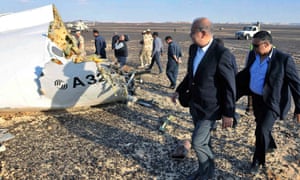Striking Fear in the Hearts of All
"Denial on behalf of the state that there is a crisis and then trying to point to some kind of third party is very normal (in Egypt), but they're very likely to adopt what state media is saying."
Hebatalla Aaha, Egypt-focused analyst, International Institute for Strategic Studies
 |
| Egypt’s prime minister, Sherif Ismail (2nd right), visits the Metrojet crash site in the Sinai desert. Photograph: EPA |
Who can blame Egypt? The country has, after all, gone through tortuous contortions in the past several years, from bidding goodbye to Hosni Mubarak after his years of benevolent dictatorship, to electing Mohammed Morsi and bringing the Muslim Brotherhood to power after its 80 years of patient and relentless grooming to become a powerful force in the country, and finally achieving that goal. And then, second thoughts and the violent unseating of a president and an ideology that Egyptians finally spurned.
All the while the country has been beset by violent Islamism, harbouring in the Sinai Peninsula the pestilence of terrorism disguising itself as Islam wearing fascist insignias attacking Egyptian law and order, police and the military, bringing chaos to the country, and particularly its tourism. A malady of dreadful proportions in a historical geographic area so heavily reliant on international travel to view the wonders of the past, and providing Egypt with one-tenth of its annual income.
In a panic of fear over its growing isolation and weakening draw thanks to hordes of violent militias, from Palestinian Islamic Jihad, Hamas, al-Qaeda, Salafist Bedouin swearing allegiance to Islamic State spreading the menace of terror, official Egypt is becoming increasingly paranoid, subscribing to conspiracy theories and spouting its defiance of the threats emanating from the global community. Note: not from within, though it knows full well that it is the malevolence of the Muslim Brotherhood that spurs most of the violence it faces.
Egyptian intellectuals and newspeople seem on board the fear-train that assails their head of state, President Abdel Fattah el-Sissi. "The people defy the conspiracy ... Egypt will not cave in to pressure", vowed state-owned Al-Gomhuria newspaper. "Egypt stands up to 'the West's terrorism'", is another that the independent daily, El-Watan declared. But these charges are not particularly new, they raised their heads during the 2011 uprising when state papers accused the West of fomenting protests.
More recent accusations are those claiming that U.S. President Barack Obama has a close relationship with the Muslim Brotherhood and was in full support of the Morsi presidency. At least they got that one right. And then there are the complaints that the West hasn't dedicated enough of its resources and determination in aiding Egypt to fight terrorism. Now that's a fairly typical Arab complaint; inviting the West to help settle violence, and afterward accusing the West of having initiated that violence.
Egypt's latest travails have surfaced through its intractable problem with that part of its population, mostly in the Sinai, where the violent jihadist militias roam, planning their attacks and occasionally carrying them out. Some successful enough to target and assassinate key Egyptian political figures. The latest being the downing of the Russian Metrojet Airbus 321, killing 244 passengers and crew on October 31 as they left the resort of Sharm el-Sheikh.
At this juncture, even Egyptian investigators analyzing the plane's black box have stated that they as well are "90 percent sure ... a bomb" was responsible for tearing the aircraft apart in flight. That admission represents an utter turn-about for an administration horrified that Britain and the U.S. initially declared their opinion relating to a bomb being responsible, and Sinai Province, associated with ISIL, boasting ownership of the carnage.
Since then, Britain, Belgium, Ireland, the Netherlands, Germany -- and Russia have announced their flights would no longer land and take off at Sharm el-Sheikh; Russia, in fact, anywhere in and from Egypt. Security is the key. And the issue is that it is entirely lacking. At any of Egypt's airports. True, passengers are often closely scrutinized, their baggage gone through carefully, but airport employees appear to have free reign to go where they will, when they wish to.
And there are those in the know, frequent travellers as journalists, who travel to the world's hot spots to cover breaking news, who describe lax security throughout the Middle East, North Africa and Asia. Where it is Westerners who are given close scrutiny on suspicion that they are up to no good, while it is members of their own community who pose the threats, and often act on those threats.
Now, countries like Egypt, Afghanistan and Pakistan, if they plan on remaining on the flight itinerary of those from the West whose governments may increasingly advise them to steer clear of those places, who must institute meaningfully stringent safety and security measures. At the same time, the success that Islamic State has been celebrating will only compel it to repeat that success, and as they attain even greater confidence in their capacity to strike beyond their own geographic interests, to plan ever more ambitious atrocities.
Labels: Africa, Asia, Atrocities, Conflict, Egypt, Jihad, Middle East, Terrorism

<< Home